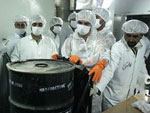 Los Angeles Times: The Obama administration might support letting Iran continue enriching uranium up to 5% purity if it agrees to other U.N. restrictions.
Los Angeles Times: The Obama administration might support letting Iran continue enriching uranium up to 5% purity if it agrees to other U.N. restrictions.
By Paul Richter, Los Angeles Times
 WASHINGTON — In what would be a significant concession, Obama administration officials say they could support allowing Iran to maintain a crucial element of its disputed nuclear program if Tehran took other major steps to curb its ability to develop a nuclear bomb.
WASHINGTON — In what would be a significant concession, Obama administration officials say they could support allowing Iran to maintain a crucial element of its disputed nuclear program if Tehran took other major steps to curb its ability to develop a nuclear bomb.
U.S. officials said they might agree to let Iran continue enriching uranium up to 5% purity, which is the upper end of the range for most civilian uses, if its government agrees to the unrestricted inspections, strict oversight and numerous safeguards that the United Nations has long demanded.
Such a deal would face formidable obstacles. Iran has shown little willingness to meet international demands. And a shift in the U.S. position that Iran must halt all enrichment activities is likely to prompt strong objections from Israeli leaders; the probable Republican presidential nominee, Mitt Romney; and many members of Congress.
But a consensus has gradually emerged among U.S. and other officials that Iran is unlikely to agree to a complete halt in enrichment. Maintaining an unconditional demand that it do so could make it impossible to reach a negotiated deal to stop the country’s nuclear program, thereby avoiding a military attack.
Iran has produced 210 pounds of 20%-enriched uranium for what it says are peaceful purposes, according to the U.N.’s International Atomic Energy Agency, but it has purified about 6 tons at 5% or below. Uranium is considered weapons grade at about 90% enrichment.
The question of whether to permit even low enrichment is highly sensitive for the U.S. government and its allies because of the risk that Iranian scientists still might be able to gain the knowledge and experience to someday build a bomb. But administration officials hope a new negotiating stance, backed by punishing economic sanctions, could help end the crisis.
The United States and five other world powers began talks with Iran on April 14 in Istanbul, Turkey, to try to broker a deal amid threats from Israel that it will bomb Iranian nuclear installations if the program isn’t dismantled soon.
The U.S. and its allies were heartened that Iran agreed in Istanbul to keep talking; at a meeting 15 months earlier, its negotiator had refused to even discuss the country’s nuclear program. Talks are scheduled to resume in Baghdad on May 23.
At least publicly, the administration had denied suggestions that it would consider approving any Iranian enrichment effort. But recently, some officials had hinted they might be willing to reevaluate that position, although with numerous caveats.
A senior administration official said that if Iran fulfills U.S. and other world powers’ demands for strict enforcement of U.N. monitoring and safeguards, “there can be a discussion” of allowing low-level domestic enrichment, “and maybe we can get there, potentially.”
But the official, who declined to be identified because of the sensitivity of the issue, emphasized that such discussions remained only a small possibility because Iran has shown so little willingness to meet international demands.
Gary Samore, the top White House official on nuclear nonproliferation, left open the door to Iranian enrichment in recent comments, saying the decision on which parts of Tehran’s program can continue “is a matter for negotiations.”
“We recognize that Iran has the right to a peaceful nuclear energy program, once it has addressed concerns about its nuclear activities,” Samore told Radio Free Europe-Radio Liberty on April 17.
Iran is a signatory to the Nuclear Nonproliferation Treaty, which says countries have a right to enrich uranium if they comply with rules to prevent bomb making. The six nations negotiating with Iran have agreed that the principles of the treaty would guide the discussions.
The U.S. and other nations are most worried about Iran’s small stockpile of 20%-grade uranium. At that level, the uranium can be refined to weapons grade with relative ease.
The so-called P5-plus-1 nations negotiating with Iran — the United States, China, Russia, France, Britain and Germany — have agreed that Iran must halt all 20% enrichment and ship that stockpile out of the country. Iran also must provide full disclosure of previous nuclear work, and sign and adhere to two additional treaty protocols that provide for more vigorous oversight, they say.
But the group now appears to be moving toward allowing lower-level enrichment, according to diplomats and nonproliferation experts.
That position is contrary to the mood of many in Congress. Lawmakers in both houses have begun circulating resolutions, with support from dozens of members, that demand an end to all Iranian enrichment. One senior Senate aide involved in the issue said any deal allowing continued enrichment “would be dead on arrival” in Congress.
Over the last several years, Congress has led the push for increasingly tough sanctions against Iran, and could approve even tougher measures that would drive Tehran away from any potential deal with the U.S. and other powers.
Israeli Prime Minister Benjamin Netanyahu also remains staunchly opposed. He argues that letting any centrifuges spin in Iran will allow scientists there to sharpen their mastery of nuclear science and edge toward bomb-making capability.


